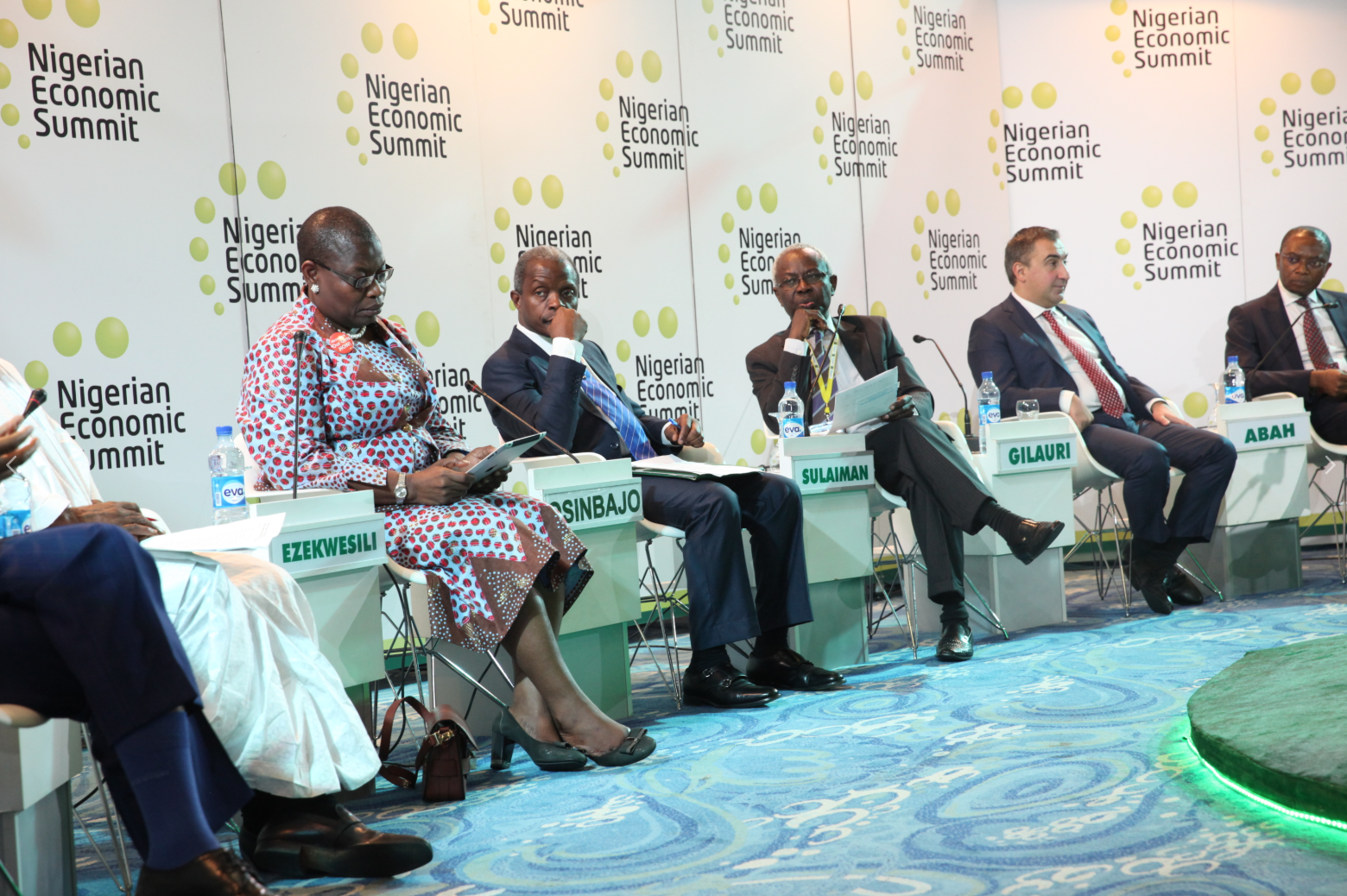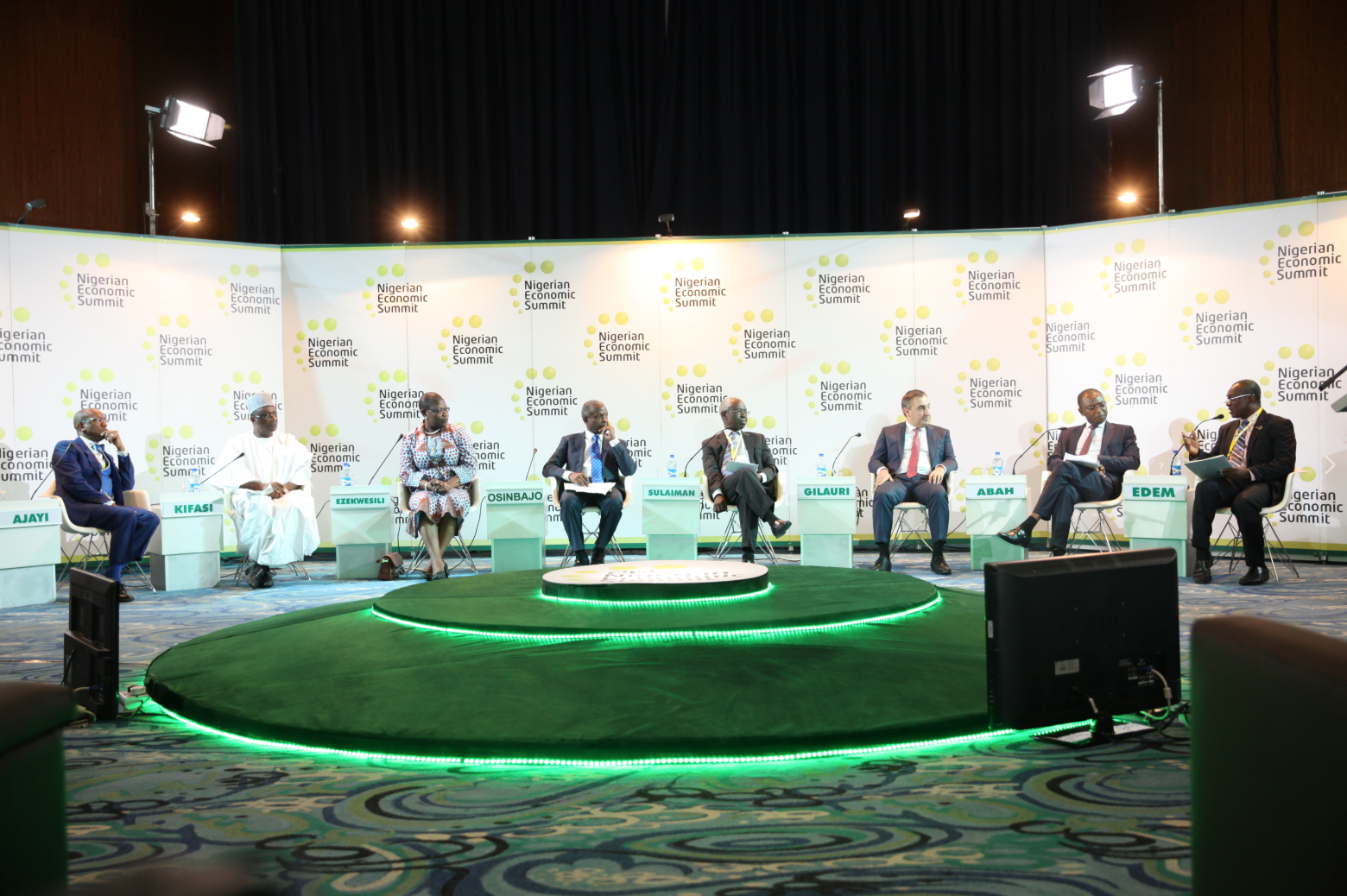21st Nigerian Economic Summit (NES #21)
OPENING ADDRESS BY HIS EXCELLENCY, PRESIDENT MUHAMMADU BUHARI (GCFR), DELIVERED BY HIS EXCELLENCY, PROF. YEMI OSINBAJO, SAN, GCON, AT THE 21ST NIGERIAN ECONOMIC SUMMIT (NES#21), AT TRANSCORP HILTON, ABUJA, OCTOBER 13 – 15, 2015
Protocol
I am pleased to be here at the coming of age summit of the Nigerian Economic Summit. At 21 The Summit theme “Tough Choices: Achieving Competitiveness, Inclusive Growth and Sustainability” is appropriate indeed. Adulthood always comes with huge and complex responsibilities. The theme thus highlights the challenges and paradoxes that define our economic and social circumstances today.
We are at a time of monumental challenges and tough choices, but also a time of incredible opportunities for achieving competitiveness, inclusive growth and sustainability. We as a government, b are called upon to make tough choices in exchange, control restrictions, altering the absurd recurrent to capital expenditure ratio, reducing the deficit and reducing the overall size of governance.
We are called upon to clean up the mess and rebuild the institutions that corruption has ravaged over the years. Terrorism in the North East in the past six years has given rise to huge socio-economic problems in that zone. In many parts, the local economy, education of millions of children have been stalled for years. The tragedy of thousands of orphaned children poses huge social challenges. The cost of rehabilitation of destroyed infrastructure and homes is huge.
To effectively compete for international and even local investment, we need to improve our position on the ease of doing business index. This calls for both radical improvements in bureaucratic delays in obtaining pre-investment processes and also substantial investment in infrastructure, especially power, roads and technology. But as we take the tough macro and micro decisions for accelerated growth, we are compelled to redress the paradox of high growth figures and widening inequality, rising unemployment and poverty. It is evident that any economic model that leaves nearly half of the citizenry behind, requires rethinking. This is why our economic model would involve substantial social investments over the next three years.
I am pleased to note that since 1993, the annual Nigerian Economic Summits (NES), have been organized by the Nigerian Economic Summit Group (NESG) and the National Planning Commission (NPC) as a public-private partnership initiative. It has remained the foremost Nigerian platform and forum, which brings together the public and private sectors to interact, share thoughts, and build consensus on policy options and implementation frameworks for our country. Let me therefore, commend the Summit group for being steadfast and consistent in providing this national platform. But this is as it should be; the task of nation building is a shared responsibility.
The more substantial requirements for development today in terms of knowledge, human resources and capital, actually lie outside of formal government structures. No meaningful economic or social change is possible without the active partnership of the private sector, which actively includes civil society. I am personally looking forward to the outcomes of this summit. Something tells me that it could have many of the answers that we need for us to win for our people and country in these very interesting times.
As you are aware, the world economy is currently going through difficult times. The global crisis has bequeathed to several countries a legacy of high unemployment, unsustainable public finances and lower potential output. It is time to look ahead and ponder the challenges we will be facing in the years to come and how to address them. There will certainly be a need to make “Tough Choices”.
Nigeria will have to swallow some “bitter pills” to heal itself of its current and impending malaise, resulting from corrupt practices and financial recklessness. We must come to a place of realisation, that we either set this country aright.
It is in recognition of this, that the present administration has embarked on a number of institutional reforms, in the various sectors of the economy, notable of which are: the implementation of the Treasury Single Account (TSA), adoption of the zero based budgeting system with effect from FY 2016, the restructuring of the Nigerian National Petroleum Corporation (NNPC) and blocking of leakages in the Federal MDAs, among others. This is expected to make additional resources available for implementation of capital projects for improved service delivery.
As a government, we are committed to creating a vibrant economy, where jobs and opportunities are readily available; where every citizen, civil servant, business and government leader, play by the same rules, obey the law and reject the temptation of bribery and corruption. We must commit to the full realisation of the Change Agenda of the present administration on how to achieve competitiveness and inclusive growth in a sustainable manner, through measurable outcomes.
Accordingly, it is expected that the Summit conclusions will be crucial in defining the agenda that will help in making Nigeria’s socio-economic environment globally more competitive. This can only be achieved with our collective will.
Your Excellencies, Distinguished Ladies and Gentlemen, we must not allow political affiliation, sectional interests, and primordial loyalties to blind us from the larger patriotic obligations of driving the nation’s growth, development and prosperity, in an atmosphere of peace, security and stability. The prevailing downward spiral in global oil price and its effect on government fiscal position, demands all stakeholders to close ranks for our collective and common good. Government is aware of the challenges we face as a nation and will make conscious efforts to address them.
We must begin to actively explore and harness other areas of our competitiveness beyond oil as it is clear that the West is doing all it can to wean itself off our crude. The advent of oil in other African countries, only further reinforces the fact that oil is no longer our competitive advantage. The onus is, therefore, on us as a people to urgently establish and build upon pillars of sustainable growth and development by ensuring effective institutions, macro-economic stability, fiscal and monetary policy reforms, restructuring of Federal Government revenues, as well as reforms to harness the potentials of SME/manufacturing, while aligning our home-grown long-term and medium term development agenda with the recently adopted UN Sustainable Development Goals which takes effect from January, 2016.
I am pleased to inform you that Government is in the process of reforming its budgeting and planning system with the preparation of a medium term successor development plan 2016-2020 and the 2016 Budget. The zero based budgeting and policy driven approach is being adopted to ensure successful implementation of the annual budget with effect from FY 2016 for enhance service delivery and the sustained and inclusive growth of the economy.
In closing, let me restate government’s commitment to this dialogue process and assure you that it will consider and adopt recommendations of the Summit and ensure that Ministries, Departments and Agencies (MDAs) of Government take steps to implement aspects of the recommendations related to them.
While wishing you stimulating and fruitful deliberations, as we collectively examine and consider our path to achieving competitiveness, inclusive growth and sustainability, I look forward to receiving the report of the Summit.
On this note, it is now my pleasure to formally declare the 21st Nigerian Economic Summit (NES#21) open.
I thank you for your attention.
"As a government, we are committed to creating a vibrant economy, where jobs and opportunities are readily available; where every citizen, civil servant, business and government leader, play by the same rules, obey the law and reject the temptation of bribery and corruption. We must commit to the full realisation of the Change Agenda of the present administration on how to achieve competitiveness and inclusive growth in a sustainable manner, through measurable outcomes."



